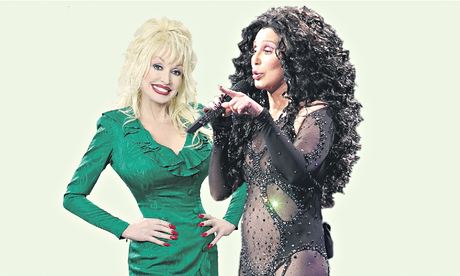
I have noticed the appearance of a fine line. It may indeed be an actual line or a crevice. There are creams promising to sort out "the appearance of fine lines" that strike me as worse than useless. If I want lines to go away, I want them to really go, not "appear" to go away – and this would require not just work but major scaffolding.
What bothers me more is the line I tiptoe along when I am confronted with famous women's faces. They look bloody weird. I feel bloody weird when I see everywhere hard boiled eggs with over-arched eyebrows, duvet cheeks, muzzle chops, squinty eyes, the strange sheen that in no way resembles the oily glow of youth. It's none of my business what women do to their faces, is it? I don't need to name them, as it would fill up entire pages. We can all see the expressionless glaze of Botox and filler, the faces so puffy that one prick would make them look like last summer's lilo.
This look – normalised, sometimes celebrated, sometimes jeered at – reaches from actually old women to younger ones. Its crosses class and ethnicity.
As a feminist, I have always argued that everyone has a fundamental right to do what they want with their bodies, a right not yet granted in much of the world. Logically, this right should cover everything from abortion to vaginoplasty, because the language of rights is essentially about individual autonomy.
But – and it's a big, implanted but – the context in which these individual decisions are made disturbs me as much as these freaky faces. Sure, I understand. Getting older is not for pussies. Like every other demented middle-aged woman, I rushed into Boots for its new serum, calling it "Protect and Survive". This turns out to be the name of the warnings I watched in the 70s about the coming nuclear war. Since my youth, the ideals of beauty have become both narrower and globalised. The conventions are marketable. Cosmetic surgery is more affordable and déclassé. Skin-lightening cream is everywhere.
At the Barbican's glorious Jean Paul Gaultier exhibition, one is reminded that, early in the 80s, he advertised in Libération for unconventional models. But we have regressed. Ageing for women is not a good look economically. Men are in their prime in their mid-50s, whereas women are told to make way for the next generation.
If you have been in a room where the majority of women and some of the men have had "work done", then you will know that no one looks younger; everyone just looks mildly surprised.
What is surprising is the confusion between what celebrities do and what the rest of us do. Ordinary women should not need to look like major stars all the time, because that is not our job. Actors, dancers and models have to look a certain way. For money. We civilians muddle through. All of us enjoy beauty when we see it or when we feel it. When celebrity becomes our mirror, a strange transference occurs if we believe these idealised faces and bodies should be ours.
We can blame the patriarchy, the film industry or magazines. We can blame the cosmetic surgery industry itself, which has successfully repackaged so many operations as the ultimate way to empower oneself. All of this is easier than blaming women's own collusion, which stings far more than any chemical peel.
Both personally and politically, though, I am not interested in reinstating the tyranny of nature. Being natural means dying in childbirth, not nude lipstick. But here is where the fine line becomes undeniably a wrinkle: the bloated faces of so many stars now do not speak to me of empowerment. Instead, it is just the opposite: powerlessness. My judgment becomes moralistic because aesthetics do not trump ethics and the prevalent aesthetic is not exactly youth but this odd veneer.
If people want to see sexy young women there are plenty around; there always will be. If an actor goes from "love interest" to "someone's mum" at 32, what needs changing is more than some women's faces. The onus on women not to look their age means waging a costly war that can only ever be lost. You get older because you have not died. The denial of a life lived is a very sad affair and, in the end, impossible. Even though we can now delete our pasts on Google, we cannot delete our grown-up children, our affairs, our contemporaries with still-functioning memories who will laugh at our ridiculousness.
Even Simone de Beauvoir, a person with a rich interior life, wrote so sadly about ageing that women of my generation thought we would do it differently. So how come we are now all meant to look the same?
For, as I look at the faces of so many actors, their surfaces pumped up for the cruel high-definition cameras, I just wonder if their oestrogen is depleting as mine is. I marvel at their no-longer "ironic" breasts. I laugh at the wisecracks of broads such as Dolly Parton, Jamie Lee Curtis and Cher on their nips and tucks. I marvel at these warriors, where the theatre of war is an operating theatre. But all of it makes me feel old. And tired. I screw up my face, making even more lines as I wonder how "a woman's right to choose" mutated into this: the right to look pre-stunned.

